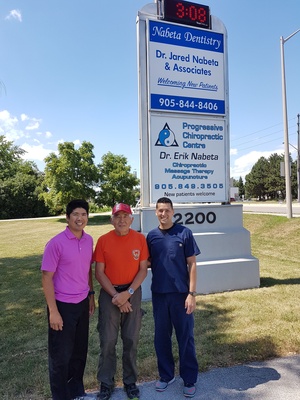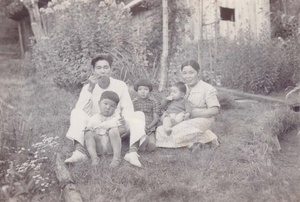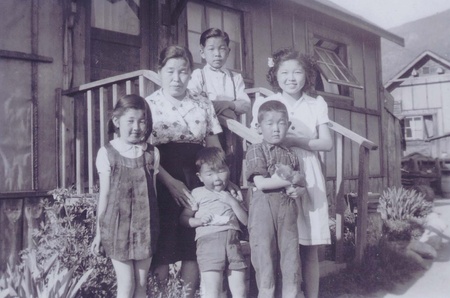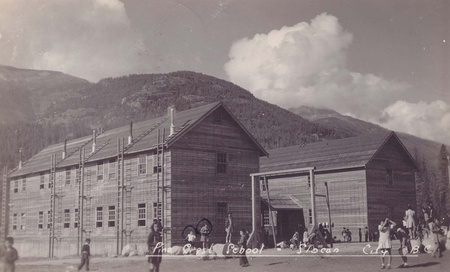As a public school teacher, I’m keenly aware of the breakneck speed at which culture is evolving and how, correspondingly, ideas of “Nikkeiness” are changing too. Who needs grandpa anymore when discussions and information are just a Google search away?
For me these days the discourse about identity has shifted from the binary hafu to something a lot more diverse. Nowadays, it isn’t unusual for me to meet students at my mostly Punjabi/Hindi school, who tell me that they have relatives that live in Japan. One even has an aunt who works for the Indian embassy in Japan. Other J-cultural connections like manga, anime, cars, baseball players (e.g., Shohei Otani) and computer games with ninja and other characters are having a decidedly positive influence on how this generation sees Japan/Japanese today. Certainly, it was not long ago, when the experience of being Japanese Canadian was not such a positive one.
As cultures change, our early experiences as Canadians are becoming part of a more abstract distant past. It’s the same old story of aging grandparents who never talked about ‘it’ (e.g., internment) and middle-aged parents who never heard the stories. Like the early immigrant stories of many other communities, our stories are still largely lost on younger generations that grew up learning the names and deeds of Dr. Martin Luther King Jr. and Nelson Mandela, but not Canadian Redress leader Art Miki, Dr. Gordon Hirabayashi, or Dr. Tom Shoyama.
Dr. Erik Nabeta is my chiropractor and his dad, Edward, my dentist. I didn’t go out of my way to seek out Nikkei doctors. I have to go all the way back to Dr. Yoneyama who delivered me as a baby to make any connection. However, after having driven by their clinic on Trafalgar Road in Oakville, Ontario for decades, I decided to drop in a few years back when I needed a new dentist.
“Dr. E,” as I call him, is 37, and married to Christine Chang, also a chiropractor. They had their first child, Jaden, earlier this year. Erik plays hockey and golf and is a self-described foodie. Whenever I visit his clinic, we are as likely to talk about new restaurants as we are about my aches and pains.
As I pondered upon the questions to ask for this interview, I wanted to get some idea about how the generations and cultures of the past and present were going to mesh. For baby Jaden, how will the WW2 experiences of relatives impact his identity as an Asian Canadian with Taiwanese and Japanese roots? Indeed, how much will it even matter once he begins this journey for himself?
How do you self-identify as an Asian Canadian whose Dad is a Nisei and Mom is Cantonese?
Over recent years, I like to call myself Canadian first. I think it’s important for Canadians to do this more because I don’t think we do this enough as a group compared to other countries. As a kid, I would identify more as Asian as I believe it was a way to separate myself almost. With regards to specific Asian identity, I do think of myself as more Chinese because my mom is from Hong Kong and I absorbed much of that culture, as well as mainly hanging out with Chinese kids when I was younger.
Because my dad was born here in Brampton, grew up in Streetsville/Erindale and was the seventh of eight; I don’t think he absorbed much of the culture. So many of the Japanese things I know were almost self-learned. It is something I do wish I had more of. Just looking at the names of my dad’s family, the first 5 were distinct Japanese names: Saeko (Sharon), Yoshinobu (Yosh), Junji, Eiji, Akemi (Amy). The last three were all English names with Japanese middle names: Richard Kosei, Ed Kiyoshi (my dad), and Andy Akira. Also not having many other Nikkei around as a kid was a big void. Until university, I only knew two others.
Was the cultural balance always 50-50 when you were growing up in Oakville?
I guess I already answered this above. Now that I’ve married into a first generation Taiwanese family, the Chinese part does dominate more. Growing up here, I was usually the only Asian kid most people knew. Moreover, most would assume I was Chinese too. It wasn’t until later that some kids asked what I was.
Can you go into some detail about what was particularly Nikkei or Cantonese, e.g., food, cultural stuff, and language about your upbringing?
For the Japanese part, it was mainly some comfort foods that my dad would eat. Besides that, there wasn’t much else. My dad is not very stereotypically Japanese. He doesn’t even eat sushi! As kids, we loved tamago gohan a lot. I didn’t think much of it until friends got grossed out by it. Nori and rice as well. Also, he would always eat the pickled yellow radish, and the smell would kill my friends. My dad’s family still meets on New Year’s Day for dinner, and we’d have lots of comfort food there. Mochi, rice crackers, mochi soup (I’ve always hated this but would eat just for my aunt), soy sauce crab, sushi/sashimi. That’s probably the extent of our Nikkei-ness.
For the Chinese side, it was everything. We used to have many family dinners with my mom’s side of the family, so the food was always there. Dim sum is still one of my favourite foods. I like to ask patients sometimes, “If you were sentenced to die, what would your last meal be?” To me, dim sum would be one. One of my biggest weaknesses is HK comfort food. I don’t want to go into too much depth, but that’s something I would never give up.
Culturally, Mom’s kind of in the middle. She follows many old Chinese traits like feng shui. She got some Chinese horoscopes done for us when we got married. She became Christian late in life but still has a Buddha on her dresser. It wasn’t until I got older that I realized how Chinese we were. We all had to play instruments. We all had extra school in the summers. We went to Saturday Chinese school, but we begged and got out of that. We’re incredibly frugal, and I’ve had to train myself out of this habit. I’m sure there are more, but those are the main ones that come to mind.
The language was always around too as Chinese was her first language. We were never taught fully but are familiar with many food items as that was the most significant part of our “Chinese-ness.” It’s one of my biggest regrets that I never stayed in Chinese school. I tell every Chinese parent to never back down against their kids. I will make sure Jaden is fully immersed in everything as he grows up.
Can you tell us a bit about your dad’s family? How far back can you go?
I wish I knew more but my grandfather Matsuichi died when I was young so I don’t even remember him. My grandmother Chiyoko Aono was bedridden by the time I could remember. I always wished I could’ve been close to them. I will ask my oldest uncle, Eiji, what he knows. I think they were from the Matsuyama area around Hiroshima. I do know they immigrated to BC when they were younger. I will try to get my hands on some pictures to maybe narrow down a timeline. I did see a high school graduation picture from 1929 of my grandfather in Vancouver.
My uncle Yosh that passed away was the oldest, and he knew the most. Five of them were born in BC, one in Saskatchewan, two in Ontario. My grandparents were Matsuichi and Chiyoko Aono. My uncles and aunts were Saeko (Sharon), Yoshinobu (Yosh), Junji, Eiji, Akemi (Amy), Richard, Ed (my dad), and Andy. I know Yosh was born in 1936 in BC and I think Saeko was a couple of years older than him. Today, they would be Saeko, 86 (1932), Yosh, 82 (1936), Junji, 78 (1940), Andy, 64 (1952). Still alive are Akemi, 81 (1937), Eiji, 76 (1942), Richard, 71 (1947), Ed, 68 (1950).
Where were they living in BC? What did your grandparents do there? What did they lose at the time of the internment? Where were they interned?
They lived in Whonnock, BC. Only thing I know is that my grandparents were both teachers turned farmers and my grandmother was a teacher in the internment camps. All the pictures I have were from the Bayfarm camp. After that, they were all farmers. They used to have a farm and sell fruit in a market in Erindale, Ontario at Dundas/Mississauga Road when they were young. It was a famous market for anyone growing up in that area at the time. It was called Oughtred Farms.
Any particular stories that the Nabetas shared about those years? What did your aunts and uncles tell you about the war years?
No, they never talked about it. The only stories I’d hear were about their farming years as kids and that I’m lucky I never had to do it. My dad was born in 1950. It wasn't until recently when I would visit my late uncle (Yosh) more to help him with his computer that I got more stories about the photo albums he’d show me.
He showed me pictures of the internment camp homes that they lived in and would talk about how cold it got in the winters. One story I’ll never forget is how the walls were thin, and some of the wood had holes in them. So because my grandmother was a teacher, they would use pencils to plug the holes, so the wind didn’t get in. I think their ages ranged from around 12 and younger.
How did the Nabetas end up in Oakville? How many siblings do you have? Where are they and what do they do?
My parents moved here to start his dental practice. It was also a place where he could get a beautiful lot in the country out of the city. It was down the street from my uncle’s home, so that’s probably how he found it. I’m the oldest and have one sister and two brothers. Kyra works for the coast guard and lives in Victoria. Dave is a medical doctor and lives in Calgary. He has one son and a girl on the way. Jeff is a motorcycle mechanic and lives in Edmonton. I also have a younger half-brother. Tyler is turning nine this year.
Can you go into some detail about your dad’s family and their career paths? When did your dad become a dentist and when did he start practice here?
Saeko was an anesthesiologist at Sick Kids hospital in downtown Toronto. Yosh was a dentist and worked at Hopedale Mall in Oakville for many years. Eiji was an engineer but stopped working to care for his mother when she got sick. Junji was in the army. Akemi worked for Revenue Canada. Richard is a dentist in Burlington and works with Jared. Andy was a carpenter. My dad graduated in 1977 and opened his practice in 1978 in Oakville.
In retrospect, what kind of effect did the internment of JCs have on the Nabetas? What could have been had it not been for WW2?
I’m not sure actually. The one trait I do notice in the uncles/aunts that went through it, they all lived simple lives and never needed anything. They all liked to live in the country away from cities in simple homes. To this day, my uncles never had air conditioning or a furnace. The uncles/aunts that didn’t go through it lived normally I guess. All lived in the city and would use modern technology. I’m not sure if that was the cause, but now that I think about it, it may have been the reason. I’ve always wondered what would have happened without WW2. They all had good jobs that took a lot of hard work and dedication. Maybe it gave them their work ethic and determination.
© 2018 Norm Ibuki










